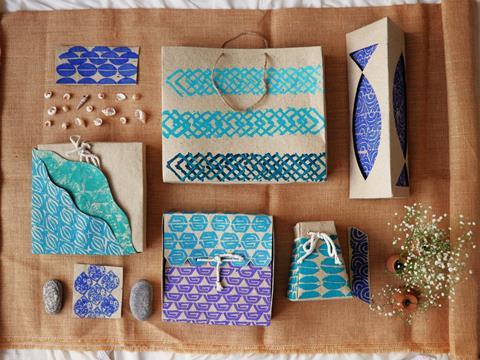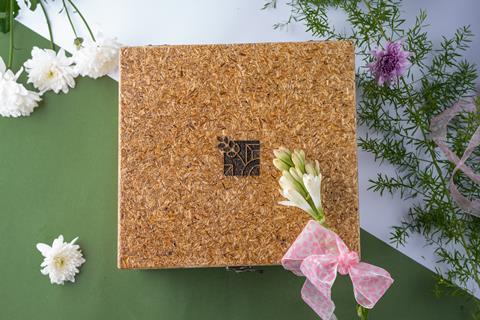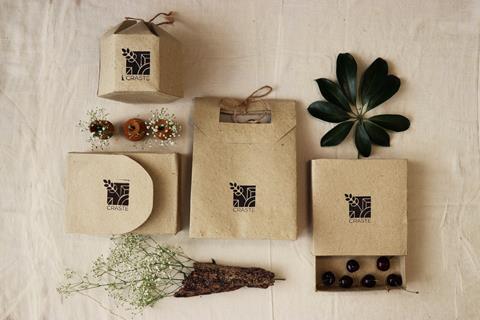
Next in our Finalist Interview series for the Sustainability Awards is Craste with its ‘100% tree-free’ food-grade, compostable packaging made from millet straw. We spoke to the company about this entry, nominated in the pre-commercialized Renewables category.
You’re a finalist in the Sustainability Awards 2023. Congratulations! To start off, could you summarise your entry, in less than 50 words?
Thank you! We use crop waste to create 100% tree-free pulp. Our technology can transform any type of crop waste, that’s often burned after harvest, into high quality customised packaging. By utilizing this waste, we not only discourage harmful crop burning practices but also provide financial support to farmers.
Why do you think the judges were impressed with your entry? Tell us about what is innovative about your project and/or about its impact on packaging sustainability.
Our entry stood out to the judges for its remarkable approach to address the sustainability concerns associated with paper-based packaging. While paper is considered a sustainable alternative to plastic and other materials, its conventional production process often leads to deforestation. We recognized this challenge and developed an innovative solution. At Craste, we looked beyond these conventional methods and instead of relying on tree-based paper production, we found a way to convert crop residue into high-quality paper, making us 100% tree-free.
This approach significantly reduces the need for deforestation, preserving valuable forest ecosystems and their biodiversity. Our technology and processes are designed to be resource efficient. Compared to traditional papermaking methods, our approach requires one-third less water, conserving water resources and minimizing the strain on water ecosystems.
Additionally, we strategically set up our Agro-Fiber conversion units in the fields themselves, reducing transportation distances and lowering carbon emissions. This makes our entire production process environmentally responsible, contributing to our overall commitment to reducing carbon footprint. We also acknowledged the need for a constant supply of raw material. If we want to make a bigger impact, we should be able to provide an alternative to timber at a larger scale, which means we need to work with a material that can be readily available and can cater to larger masses. Our technology works with various types of crop residue, ensuring a consistent supply of paper throughout the year.
Overall, our project offers an innovative and impactful solution to the sustainability challenges of paper-based packaging. By reducing deforestation, conserving water, and minimizing carbon emissions, we are making a tangible difference in enhancing the sustainability of the packaging industry.

When and how do you intend to launch/commercialize this innovation?
We have taken our first step towards commercialization with the launch of our collaboration with AbInBev, where we developed 100% crop residue-based packaging for Corona beer. By utilizing the barley crop waste from the fields, we created sustainable six-packs for Corona beer bottles. This successful partnership is a testament to the viability and market-readiness of our innovation. Since we can work with any type of crop residue, we also offer R&D as a revenue service to customers looking for circular packaging solutions and have some innovative projects in the pipeline with them.
We are actively working on various pilot projects with leading companies across diverse industries, aiming to help them transition their value chains from linear to circular models. These projects, alongside some curated in-house products, will soon be available in our online shop, providing customers with sustainable choices. We eagerly welcome more exciting collaborations that align with our vision of transforming industries and making our world greener. Our goal is to continue launching groundbreaking solutions, both in-house and through partnerships, as we strive to create a more sustainable future.
You’re shortlisted for the pre-commercialized category for Renewable Materials. What do you see as the key demands and challenges in relation to developing new materials from renewable feedstocks for packaging applications?
The demands for developing new materials from renewable feedstocks for packaging applications are driven by two key factors. Firstly, the alarming annual deforestation rate of approximately 3.2 billion trees for traditional paper production emphasizes the urgent need for sustainable alternatives. Secondly, the projected growth of the global packaging market from USD 1,098.81 billion in 2023 to USD 1,333.02 billion by 2028 at a CAGR [Compound Annual Growth Rate] of 3.94% presents significant market opportunities for renewable materials. Sustainable packaging demand has surged after the plastic ban, shifting to paper-based solutions.
However, concerns about deforestation arise. Crop residue-based packaging meets this demand sustainably, repurposing agricultural waste and preserving our forests for future generations. As we expand, we acknowledge the risks of supply chain disruptions and to mitigate these, we establish local production units near crop residue sources. Protecting our intellectual property is crucial, and we work closely with specialists to ensure legal safeguards.

What do you think are the main opportunities in this area or what future innovations do you predict in this area?
From ground-breaking advancements in moulded packaging to crafting lifestyle products from tree-free paper, the potential to transform the industry is boundless. Embracing circular models, fuelled by diverse material solutions that go beyond crop waste, will redefine the landscape of sustainability in the coming future.
As consumers become increasingly aware of the climate impact, demand for innovative sustainable designs that focus on reuse and repurposing packaging, alongside using green materials, will soar. Embracing these opportunities will drive sustainable practices, promote circular economy principles, and cater to the increasing global demand for environmentally conscious packaging options.
The winners of the Sustainability Awards 2023 will be announced at the Sustainable Packaging Summit, which takes place in Amsterdam on 14-15 November. The Summit mobilises leaders of the FMCG value chain, policymakers, NGOs, recyclers and investors to collaborate, remove barriers and identify opportunities on the road to sustainable transformation.
To learn more or register, visit https://www.packagingsummit.earth/amsterdam2023/.
If you liked this article, you might also enjoy:
The L’Oréal approach to packaging sustainability
What steps is Apple taking to make its packaging more sustainable?
How did Brazil achieve its 100% aluminium can recycling rate – and can it be replicated in the EU?
Experts have their say on the EU’s Packaging and Packaging Waste Directive revisions
















No comments yet